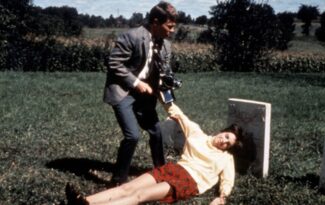Sterile Cuckoo (Alan J. Pakula, 1969), USA
Reviewed by Luther Richert viewed at the AFI FilmFestival.

Every year the American Film Institute Film Festival pays tribute to one of the movie industry’s greats. This years tribute honored and showcased the work of one of America’s greatest film director’s and producer’s, Alan J. Pakula. Pakula is perhaps best know for his “paranoid trilogy” Klute (1971), The Parallax View (1974) and All the President’s Men (1976) which are as relevant in today’s political climate as they were then. Surprisingly, his first film as a director was not a political thriller but a romantic comedy. Sterile Cuckoo (1969) was one of the films screened during the AFIFest tribute to Pakula.
The opening shot of Sterile Cuckoo is a documentary style, slice of life, wide angle long shot of two people walking to a bus-stop on an otherwise boarded up and deserted block. It’s our hero, Pookie (Liza Minnelli who was nominated for an Academy Award for her show stealing performance) and her stoic father (Austin Green). The street resembles Main Street in a soon to be forgotten small town like those in the rust belt where all the factory jobs dried up. After her father leaves, Pookie sits alone on a bench waiting for the bus. Upon the buses arrival, Jerry (Wendell Burton) a guy who looks and acts like Ron Howard’s Richie Cunningham on Happy Days, gets off the bus and sits down at a bench near her to play with his brand new camera. In one of the many creative and unexpected uses of the movie frame by Pakula in this film, Pookie sticks her head in front of his camera lens POV from above, appearing like the head of a giant coming from outer-space. After convincing him to take her picture, she starts a flirtatious conversation with him and doesn’t stop pursuing him from that moment on. The film takes place over the next nine months beginning with their very first day of college and ending near to the completion of the school year.
For the most part, Sterile Cuckoo is an upper middle class coming of age film like Love Story (Arthur Hiller,1970) and The Graduate (Mike Nichols 1967). It’s greatest moments are when it’s able to expose the youthful uncertainty and fear that lies just below the surface of even the most confident characters. Cinematically it holds up to The Graduate with creative use of framing, extreme wide angle shots that beautifully capture the look and feel of East Coast college towns, humor (like when Pookie want’s to be photographed laying like a corpse in-front of her favorite grave stone) and long unedited shots driven entirely by Liza Minnelli brilliant performance and natural charisma. Two such scenes captured almost completely in a single shot are the hilarious and heart breaking love scene when Pookie and Jerry loose their virginity and a scene of Pookie breaking down on the telephone as Jerry tries to break up with her.
The thing I find disturbing about this film, and probably the reason I had never heard of it before, is captured in the title. One of the plot points in this film is that Pookie pretends to be pregnant when she’s not. Perhaps she miscarried or can’t even have children? We never find out. The title of the film suggests, however, that she’s “sterile” and can’t get pregnant. In addition, her frivolous non-conformity (shaped by the tragic loss of her mother at child birth and her upbringing by an emotionally distant father) is treated like mental illness in this film. She’s “cuckoo.”
What’s disturbing about this is that the value of this extraordinary, interesting, creative person is questioned because of her lack of fertility and unwillingness to conform . By today’s standards, she certainly does NOT have a mental illness. The subtext of this story is that it’s “how a regular college joe, Jerry, lost his virginity to a crazy chick and had a hard time dumping her.” Terrible. I happen to think Pookie was worthy of the attention she craved and demanded. I don’t think the filmmakers shared that opinion. In the last scene, Jerry sends Pookie back to the lonely isolation of her small town and distant father… against her will. He’s not even a family member. Jerry considers it his right and duty to send Pookie back home because in this world she is a worthless “sterile cuckoo,” who was good enough for sex but not marriage. Perhaps I’m being too harsh towards this otherwise masterpiece of cinema, but that’s how the ending made me feel. Pookie was wronged by this movie and deserved much, much better!
About this entry
You’re currently reading “Sterile Cuckoo (Alan J. Pakula, 1969), USA,” an entry on Student Film Reviews
- Published:
- 11.25.19 / 11pm
- Category:
- AFI Filmfest 2019, Films
No comments
Jump to comment form | comments rss [?]